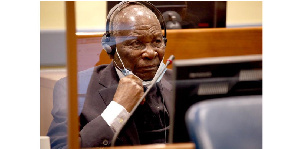Africa News of Wednesday, 9 August 2023
Source: thecitizen.co.tz
Rwandans lay claim to $50 million estate owned by Felician Kabuga
 Rwanda's Félicien Kabuga during his first appearance before the Mechanism for International Tribunal
Rwanda's Félicien Kabuga during his first appearance before the Mechanism for International Tribunal
With uncertainty hanging over the case of Felicien Kabuga after The Hague’s UN Tribunal court declared him unfit to stand trial on health grounds, a case has been filed to freeze his properties.
The immovable assets owned by the alleged mastermind of the 1994 genocide include land and buildings in his home country.
An umbrella organisation of genocide survivors called Ibuka is seeking the freezing of his properties worth millions of dollars.
The lawsuit was filed on June 8 at the intermediate court in Kigali and involves various properties, including land and buildings. Although the exact value of his Rwanda-based properties remains unclear, they were believed to be worth $50 million at the time of his arrest in Paris in 2020.
The litigants not only want the property frozen but also to prevent its sale or transfer while the justice process unfolds for the ailing Kabuga.
The 90-year-old Kabuga is currently detained in The Hague, Netherlands, where he faces trial by the International Residual Mechanism for Criminal Tribunals (the Mechanism) for his role in the genocide against the Tutsi.
The former businessman before and during the genocide is charged with seven counts, including genocide, complicity in genocide, and direct and public incitement to commit genocide.
Other charges include attempts to commit genocide and conspiracy to commit genocide, as well as persecution and extermination, both crimes against humanity.
Reports from Rwanda and the Arusha-based Mechanism indicated that the litigants had been requested to present specific documents from the National Land Authority on Kabuga’s alleged properties.
These documents are vital in demonstrating the relationship between Kabuga and the properties Ibuka wants frozen. Sources in France have it that at the time of his arrest in May 2020, Kabuga owned a tea plantation, a mill, warehouses, and apartments, among other properties.
Some of the properties were in Kenya, where he spent quite some time while on the run. One of them is said to be the Spanish Villas in Nairobi’s upmarket suburb.
Further reports had it that he also owned properties in Switzerland and Paris, where, at different times, he sought refuge from being arrested.
On June 6, 2023, the Trial Chamber of the UN Tribunal in The Hague (the Mechanism) found, by a majority, that Mr Kabuga is not fit to stand trial due to his poor health.
The Trial Chamber decided, by majority, to continue the proceedings against Mr. Kabuga in accordance with an “alternative finding procedure that resembles a trial as closely as possible, but without the possibility of a conviction”.
Mr Kabuga was not only the alleged mastermind of the Rwanda genocide, in which nearly a million people were hacked to death in 1994 following the killing of President Juvenal Habyarimana on April 6th, 1994.
He was also the alleged financier of the killings, which shocked the world and led to one of the largest influx of refugees from Rwanda to Tanzania, the DRC, the Congo, and other countries.
After the mass killings came to a halt with the RPF government taking over, he fled Rwanda but was later indicted and had a $5 million bounty on his head.
Entertainment









